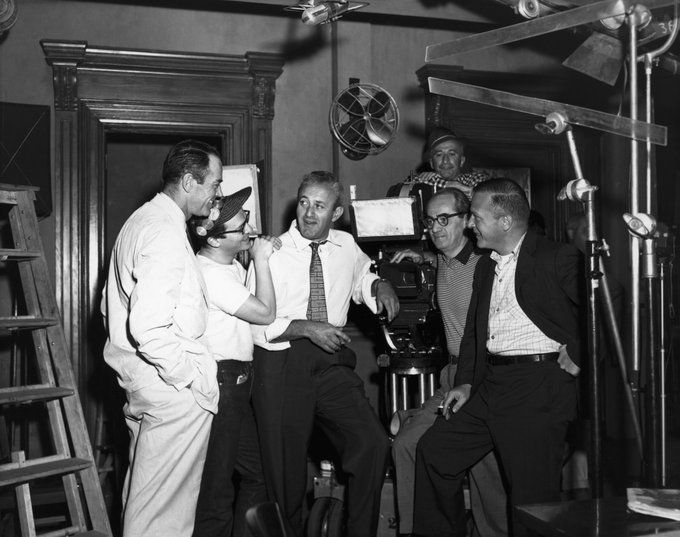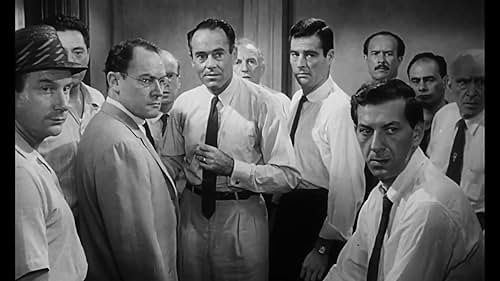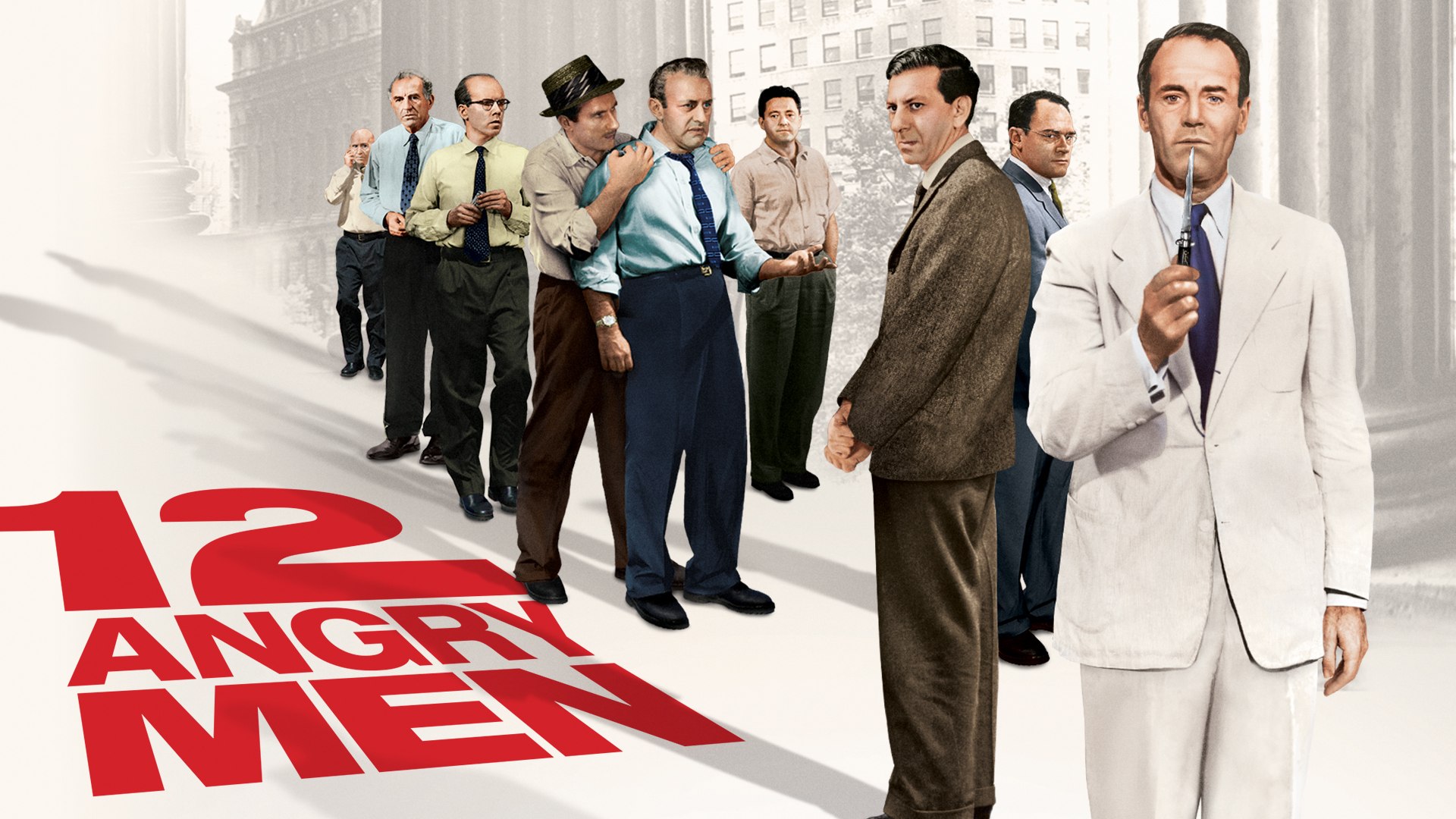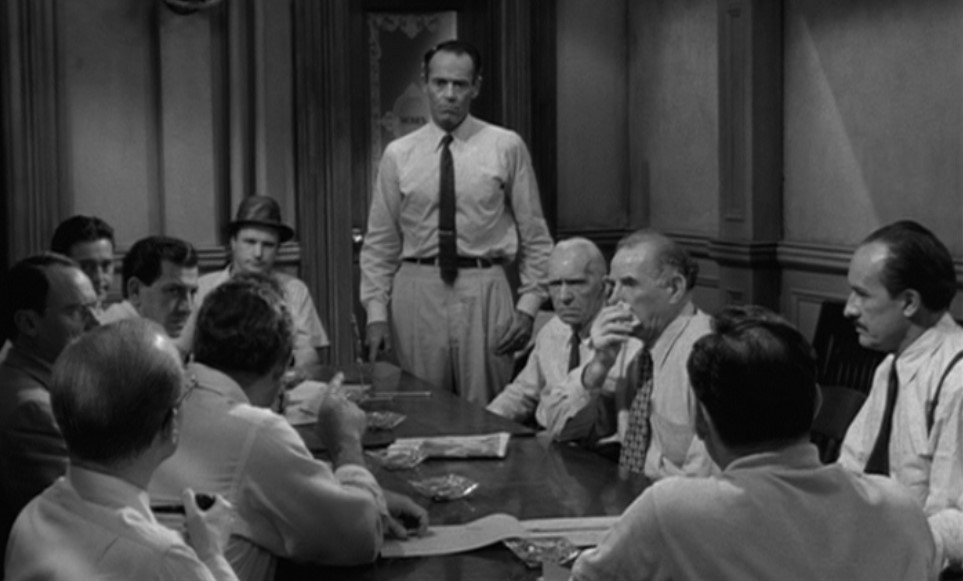🎬 12 Angry Men: A Riveting Exploration of Justice, Bias, and Moral Responsibility (1957)

Directed by Sidney Lumet, 12 Angry Men (1957) is a landmark in American cinema that unfolds in a single room, where twelve jurors deliberate the fate of a young defendant accused of murder. This intense, dialogue-driven courtroom drama reveals how personal biases, moral courage, and social influences impact justice. Featuring an all-star cast led by Henry Fonda, the film delves deeply into the psychological dynamics within the jury, using tension and moral debates to create a powerful examination of human nature, fairness, and integrity.
⚖️ Plot Overview: A Jury Room and the Fight for a Fair Verdict
12 Angry Men follows twelve jurors tasked with deciding whether a young man is guilty of murdering his father. At first, all but one juror are convinced of the boy’s guilt, ready to deliver a quick guilty verdict. However, Juror 8 (Henry Fonda) voices a “not guilty” vote, urging his fellow jurors to examine the evidence more closely. Throughout the film, each juror’s personality, biases, and backgrounds come to the surface, leading to intense confrontations, shifting alliances, and moments of introspection.
As the jurors debate the case, Juror 8 systematically questions the credibility of the evidence, exposing flaws in testimonies, witness inconsistencies, and potential reasonable doubt. His persistence forces each juror to confront their assumptions, biases, and moral obligations, leading them to reconsider the impact of their decision on the young man’s life. The film builds to a gripping conclusion as the jurors’ minds change and they ultimately reach a unanimous decision, redefining justice as they examine their own beliefs.

🎭 Iconic Performances and Complex Character Portrayals
- Henry Fonda as Juror 8: Fonda’s portrayal of Juror 8 is dignified and compelling, bringing quiet resolve and moral fortitude to the role. His character’s insistence on thorough deliberation embodies the principles of justice and fairness, making him the voice of reason against the backdrop of prejudice and groupthink. Fonda’s calm but determined demeanor gives the character strength and empathy, making him the film’s moral anchor.
- Lee J. Cobb as Juror 3: Cobb’s performance as Juror 3 is intense and emotionally charged, portraying a man struggling with personal anger that clouds his judgment. His outbursts and stubbornness make him a foil to Fonda’s calm rationality, creating a dynamic conflict that drives much of the film’s tension. Cobb’s raw portrayal of inner turmoil adds complexity and depth, making Juror 3’s eventual transformation deeply moving.
- Supporting Cast: The ensemble cast, including E.G. Marshall, Jack Warden, and Martin Balsam, brings each juror’s distinct personality and biases to life, creating a realistic and relatable group of characters. Each actor’s performance adds layers to the story, representing various aspects of human nature, from apathy to empathy, prejudice to open-mindedness.
🎥 Intimate Cinematography and Claustrophobic Atmosphere

Sidney Lumet’s direction uses the confined jury room setting to intensify the film’s psychological drama, making the space feel increasingly claustrophobic as tensions rise. The film’s cinematography captures subtle shifts in the characters’ expressions and body language, using close-ups and gradual camera angles to convey the weight of their deliberations. Lumet purposefully narrows the frame as the film progresses, mirroring the growing emotional and ethical pressure on the jurors.
The deliberate pacing and minimalistic setting draw attention to dialogue and character development, allowing the story to focus entirely on the psychological and moral unraveling of each juror. The absence of action or scenery creates an intimate experience, immersing viewers in the moral conflicts and personal revelations of the characters as they argue and evolve.
💡 Themes of Justice, Bias, and Moral Integrity
12 Angry Men is a powerful study of justice and moral responsibility, examining how personal biases, societal pressures, and inner conflicts can shape one’s perspective on truth and fairness. The film explores the importance of due process, the dangers of snap judgments, and the courage it takes to stand up for one’s beliefs in the face of opposition. Juror 8’s insistence on a fair trial represents the ideal of justice, showing how empathy and critical thinking can overcome prejudice and apathy.

Each juror’s journey highlights various facets of human nature, including the impact of prejudice (Juror 10), personal trauma (Juror 3), and indifference (Juror 7). The film’s portrayal of the struggle to put aside these biases and uphold justice resonates universally, inviting audiences to reflect on their own beliefs and the importance of maintaining integrity and empathy.
🎬 Film Details:
- Title: 12 Angry Men
- Director: Sidney Lumet
- Release Date: April 10, 1957
- Cast: Henry Fonda, Lee J. Cobb, E.G. Marshall, Jack Warden, Martin Balsam, Jack Klugman
- Genre: Drama, Courtroom
- Runtime: 1h 36m
- Notable Aspects: One-room setting, psychological depth, powerful ensemble performances, exploration of justice and bias
🏆 Final Verdict: A Timeless and Thought-Provoking Courtroom Classic

12 Angry Men remains a cinematic masterpiece that transcends time, challenging viewers to consider the nature of justice, the power of reasonable doubt, and the moral courage required to question assumptions. With its compelling performances, intelligent writing, and Sidney Lumet’s masterful direction, the film is a gripping exploration of human nature and societal responsibility. For those interested in thought-provoking, character-driven dramas, 12 Angry Men is a must-watch that continues to inspire discussions about fairness, empathy, and the complexities of the human psyche.











